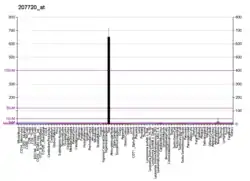Loricrin
Loricrin is a protein that in humans is encoded by the LOR gene.[3][4][5]
| LORICRIN | |||||||||||||||||||||||||
|---|---|---|---|---|---|---|---|---|---|---|---|---|---|---|---|---|---|---|---|---|---|---|---|---|---|
| Identifiers | |||||||||||||||||||||||||
| Aliases | LORICRIN, loricrin, LOR, loricrin cornified envelope precursor protein | ||||||||||||||||||||||||
| External IDs | OMIM: 152445 GeneCards: LORICRIN | ||||||||||||||||||||||||
| |||||||||||||||||||||||||
| |||||||||||||||||||||||||
| |||||||||||||||||||||||||
| Orthologs | |||||||||||||||||||||||||
| Species | Human | Mouse | |||||||||||||||||||||||
| Entrez |
| ||||||||||||||||||||||||
| Ensembl |
| ||||||||||||||||||||||||
| UniProt |
| ||||||||||||||||||||||||
| RefSeq (mRNA) |
| ||||||||||||||||||||||||
| RefSeq (protein) |
| ||||||||||||||||||||||||
| Location (UCSC) | Chr 1: 153.26 – 153.26 Mb | n/a | |||||||||||||||||||||||
| PubMed search | [2] | n/a | |||||||||||||||||||||||
| Wikidata | |||||||||||||||||||||||||
| |||||||||||||||||||||||||
Function
Loricrin is a major protein component of the cornified cell envelope found in terminally differentiated epidermal cells.[5]
Loricrin is expressed in the granular layer of all keratinized epithelial cells of mammals tested including oral, esophageal and stomach mucosa of rodents, tracheal squamous metaplasia of vitamin A deficient hamster and estrogen induced squamous vaginal epithelium of rats.[6]
Clinical significance
Mutations in the LOR gene are associated with Vohwinkel's syndrome and Camisa disease, both inherited skin diseases.
References
- GRCh38: Ensembl release 89: ENSG00000203782 - Ensembl, May 2017
- "Human PubMed Reference:". National Center for Biotechnology Information, U.S. National Library of Medicine.
- Hohl D, Mehrel T, Lichti U, Turner ML, Roop DR, Steinert PM (May 1991). "Characterization of human loricrin. Structure and function of a new class of epidermal cell envelope proteins". J Biol Chem. 266 (10): 6626–36. doi:10.1016/S0021-9258(18)38163-8. PMID 2007607.
- Yoneda K, Hohl D, McBride OW, Wang M, Cehrs KU, Idler WW, Steinert PM (Oct 1992). "The human loricrin gene". J Biol Chem. 267 (25): 18060–6. doi:10.1016/S0021-9258(19)37152-2. PMID 1355480.
- "Entrez Gene: LOR loricrin".
- Hohl D, Ruf Olano B, de Viragh PA, Huber M, Detrisac CJ, Schnyder UW, Roop DR (1993). "Expression patterns of loricrin in various species and tissues". Differentiation. 54 (1): 25–34. doi:10.1111/j.1432-0436.1993.tb01585.x. PMID 8405772.
Further reading
- Ishida-Yamamoto A, Takahashi H, Iizuka H (1998). "Loricrin and human skin diseases: molecular basis of loricrin keratodermas". Histol. Histopathol. 13 (3): 819–26. PMID 9690138.
- Ishida-Yamamoto A (2003). "Loricrin keratoderma: a novel disease entity characterized by nuclear accumulation of mutant loricrin". J. Dermatol. Sci. 31 (1): 3–8. doi:10.1016/S0923-1811(02)00143-3. PMID 12615358.
- Candi E, Melino G, Mei G, et al. (1995). "Biochemical, structural, and transglutaminase substrate properties of human loricrin, the major epidermal cornified cell envelope protein". J. Biol. Chem. 270 (44): 26382–90. doi:10.1074/jbc.270.44.26382. PMID 7592852.
- Yoneda K, Steinert PM (1993). "Overexpression of human loricrin in transgenic mice produces a normal phenotype". Proc. Natl. Acad. Sci. U.S.A. 90 (22): 10754–8. Bibcode:1993PNAS...9010754Y. doi:10.1073/pnas.90.22.10754. PMC 47856. PMID 8248167.
- Ishida-Yamamoto A, Hohl D, Roop DR, et al. (1994). "Loricrin immunoreactivity in human skin: localization to specific granules (L-granules) in acrosyringia". Arch. Dermatol. Res. 285 (8): 491–8. doi:10.1007/BF00376822. PMID 8274037. S2CID 9857068.
- Maestrini E, Monaco AP, McGrath JA, et al. (1996). "A molecular defect in loricrin, the major component of the cornified cell envelope, underlies Vohwinkel's syndrome". Nat. Genet. 13 (1): 70–7. doi:10.1038/ng0596-70. PMID 8673107. S2CID 9108586.
- Steinert PM, Marekov LN (1997). "Direct evidence that involucrin is a major early isopeptide cross-linked component of the keratinocyte cornified cell envelope". J. Biol. Chem. 272 (3): 2021–30. doi:10.1074/jbc.272.3.2021. PMID 8999895.
- Ishida-Yamamoto A, McGrath JA, Lam H, et al. (1997). "The molecular pathology of progressive symmetric erythrokeratoderma: a frameshift mutation in the loricrin gene and perturbations in the cornified cell envelope". Am. J. Hum. Genet. 61 (3): 581–9. doi:10.1086/515518. PMC 1715943. PMID 9326323.
- Korge BP, Ishida-Yamamoto A, Pünter C, et al. (1997). "Loricrin mutation in Vohwinkel's keratoderma is unique to the variant with ichthyosis". J. Invest. Dermatol. 109 (4): 604–10. doi:10.1111/1523-1747.ep12337534. PMID 9326398.
- Candi E, Tarcsa E, Idler WW, et al. (1999). "Transglutaminase cross-linking properties of the small proline-rich 1 family of cornified cell envelope proteins. Integration with loricrin". J. Biol. Chem. 274 (11): 7226–37. doi:10.1074/jbc.274.11.7226. PMID 10066784.
- Richard G, Brown N, Smith LE, et al. (2000). "The spectrum of mutations in erythrokeratodermias--novel and de novo mutations in GJB3". Hum. Genet. 106 (3): 321–9. doi:10.1007/s004390051045. PMID 10798362.
- Lee CH, Marekov LN, Kim S, et al. (2000). "Small proline-rich protein 1 is the major component of the cell envelope of normal human oral keratinocytes". FEBS Lett. 477 (3): 268–72. doi:10.1016/S0014-5793(00)01806-8. PMID 10908733. S2CID 12228606.
- Candi E, Oddi S, Terrinoni A, et al. (2001). "Transglutaminase 5 cross-links loricrin, involucrin, and small proline-rich proteins in vitro". J. Biol. Chem. 276 (37): 35014–23. doi:10.1074/jbc.M010157200. PMID 11443109.
- Matsumoto K, Muto M, Seki S, et al. (2001). "Loricrin keratoderma: a cause of congenital ichthyosiform erythroderma and collodion baby". Br. J. Dermatol. 145 (4): 657–60. doi:10.1046/j.1365-2133.2001.04412.x. PMID 11703298. S2CID 32827034.
- O'Driscoll J, Muston GC, McGrath JA, et al. (2002). "A recurrent mutation in the loricrin gene underlies the ichthyotic variant of Vohwinkel syndrome". Clin. Exp. Dermatol. 27 (3): 243–6. doi:10.1046/j.1365-2230.2002.01031.x. PMID 12072018. S2CID 44453747.
- Jang SI, Steinert PM (2003). "Loricrin expression in cultured human keratinocytes is controlled by a complex interplay between transcription factors of the Sp1, CREB, AP1, and AP2 families". J. Biol. Chem. 277 (44): 42268–79. doi:10.1074/jbc.M205593200. PMID 12200429.
- Strausberg RL, Feingold EA, Grouse LH, et al. (2003). "Generation and initial analysis of more than 15,000 full-length human and mouse cDNA sequences". Proc. Natl. Acad. Sci. U.S.A. 99 (26): 16899–903. doi:10.1073/pnas.242603899. PMC 139241. PMID 12477932.
This article is issued from Wikipedia. The text is licensed under Creative Commons - Attribution - Sharealike. Additional terms may apply for the media files.


